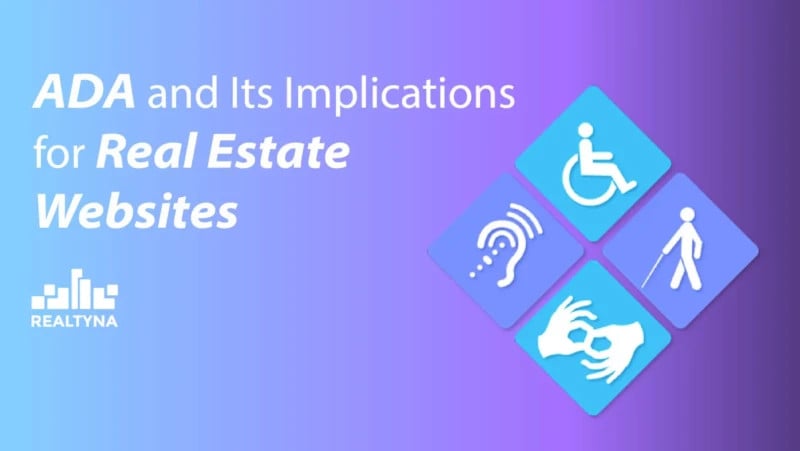You are viewing our site as an Agent, Switch Your View:
Agent | Broker Reset Filters to Default Back to ListADA and Its Implications for Real Estate Websites
July 24 2022
 The Americans with Disabilities Act was signed into law in 1990, and it has provided a series of rights for folks with accessibility requirements. Also, it has reshaped how businesses offer services to the public.
The Americans with Disabilities Act was signed into law in 1990, and it has provided a series of rights for folks with accessibility requirements. Also, it has reshaped how businesses offer services to the public.
Since 2010, when most businesses started to provide major services on the web, the focus has shifted a bit towards the online world. According to the WCAG 2.0 AA, websites that provide services to the public are considered places of public accommodation and are obliged to provide accessible services to people with all ranges of abilities.
To make things more complicated, the Department of Justice has yet to offer clear guidelines on how online businesses should proceed with the ADA. Nevertheless, WCAG has been used as a source of measures for compliance with the ADA.
Are Real Estate Websites Subject to ADA?
Despite the lack of clear specifications by the DOJ, the consensus suggests that real estate websites offer products and services that are indeed aimed at the general public, and they must provide accessible features or be subjected to litigation.
So the answer to this question is yes. If you stick around, I will provide some suggestions to help you start getting a hold of these issues. We begin with the most common shortcomings of real estate websites.
What Are Common Issues with ADA Compliance for Real Estate Websites?
As with any other website that interacts with the public, real estate websites should make sure that their web and mobile services are easy to use for people with disabilities. Here are some of the most common issues with websites in this regard:
- The website is not easy to navigate.
- Folks with disabilities cannot use their specific tools like screen reading, zooming, etc. to interact with the website.
- Videos do not have closed captions or transcriptions, and folks with visual impairments are unable to access this form of content.
- Not enough time is considered for the disabled to take necessary actions on the website.
- Not enough guidance is provided on how to take actions, and folks with disabilities might inadvertently take unwanted actions.
What Can I Do to Avoid Litigations with Regard to Website Accessibility?
There are so many things you can do to avoid being the next subject of a web accessibility lawsuit. Here are some actions to start with:
Take Actions Now
Don't wait for an official announcement or guidelines by the DOJ for web accessibility. Work on improving the accessibility features today.
Create an Action Plan
Based on the results of your assessment, or that of an expert service provider, you must create an action plan and start implementing what is necessary to maintain compliance with the ADA.
Stay Updated with the Recommendations
WCAG is subject to occasional updates and further recommendations. Make sure you are familiar with its guidelines, and check it every now and then.
Add an Accessibility Notice on Your Website
While you are assessing and taking actions, you can include a notice with regards to accessibility features of your website. This shows you care about the issue of accessibility, and you are dedicated to equal access for all members of the society. NAR has implemented this statement on their website, and you can freely use it on your website.
Bottom Line
Web accessibility is an issue you cannot ignore, so make sure you pay enough attention to it and consider that as part of your business growth online.
To view the original article, visit the Realtyna blog.









